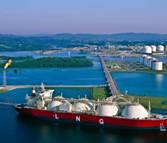Israeli government approves some gas exports
By SARA TOTH STUB
JERUSALEM -- Market worries over the future development of Israel's energy sector eased Wednesday after government officials approved the export of 40% of the natural gas from the country's offshore Leviathan reserve, opening the way for an inflow of billion of dollars into the economy.
"Today is a lucky day for the state of Israel," said Finance Minister Yair Lapid at a press conference. "The gas is no less than a miracle." He added the exports will bring in $60 billion for the economy over 20 years.
Energy and Water Resources Minister Silvan Shalom said: "It is the right decision. The country's educational and health systems...will benefit from it."
 The decision, made by a group of ministers, is expected to get government cabinet approval next week. Nevertheless, it has its critics. Environmental Protection Minister Amir Peretz said he is concerned that it jeopardizes Israel's long-term energy security.
The decision, made by a group of ministers, is expected to get government cabinet approval next week. Nevertheless, it has its critics. Environmental Protection Minister Amir Peretz said he is concerned that it jeopardizes Israel's long-term energy security.
In the last decade, there have been several large gas discoveries in Israel, including the Leviathan field, which contains an estimated 19 trillion cubic feet of gas. The export quota doesn't apply to the smaller Tamar field, which contains about 9 trillion cubic feet of gas, much of it already committed to domestic companies.
Before the announcement, there was some fear in the market that if Israel didn't grant permission to export a significant amount of gas, the few foreign firms working here -- that have been instrumental in developing the industry -- would leave.
"This announcement means foreign companies can go ahead with the development of the Leviathan field," said Steven Shein, a trader at Psagot Investment House in Tel Aviv.
Australia's Woodside Petroleum recently signed an agreement to acquire a 30% stake in Leviathan. The other major foreign player in Israel's emerging natural gas sector is Houston-based Noble Energy, which holds large stakes in the Leviathan, Tamar and other fields.
The gas, and the potential for exporting it, has been exerting upward pressure on the Israeli currency, the shekel, lately. The central bank lowered the interest rate twice in May, once in an unscheduled move, to try to weaken the shekel.
The bank also announced it would buy $2 billion on the open market in the next 6 months to try to weaken the shekel. A shekel that is too strong could hurt Israel's export-dependent economy by making its products less competitive abroad, the bank has said.
Dow Jones Newswires






Comments